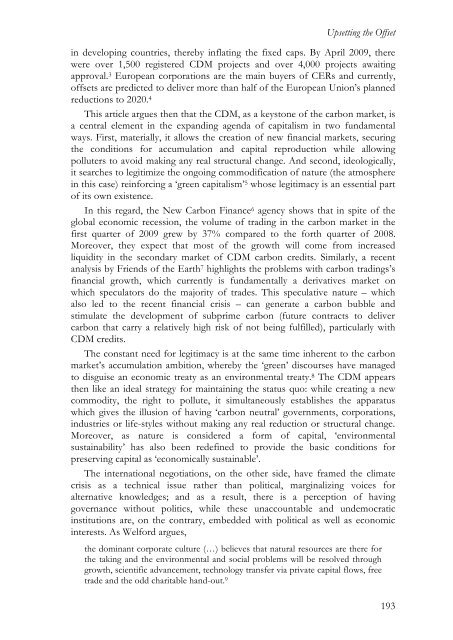Upsetting the Offset - Transnational Institute
Upsetting the Offset - Transnational Institute
Upsetting the Offset - Transnational Institute
You also want an ePaper? Increase the reach of your titles
YUMPU automatically turns print PDFs into web optimized ePapers that Google loves.
<strong>Upsetting</strong> <strong>the</strong> <strong>Offset</strong><br />
in developing countries, <strong>the</strong>reby inflating <strong>the</strong> fixed caps. By April 2009, <strong>the</strong>re<br />
were over 1,500 registered CDM projects and over 4,000 projects awaiting<br />
approval. 3 European corporations are <strong>the</strong> main buyers of CERs and currently,<br />
offsets are predicted to deliver more than half of <strong>the</strong> European Union’s planned<br />
reductions to 2020. 4<br />
This article argues <strong>the</strong>n that <strong>the</strong> CDM, as a keystone of <strong>the</strong> carbon market, is<br />
a central element in <strong>the</strong> expanding agenda of capitalism in two fundamental<br />
ways. First, materially, it allows <strong>the</strong> creation of new financial markets, securing<br />
<strong>the</strong> conditions for accumulation and capital reproduction while allowing<br />
polluters to avoid making any real structural change. And second, ideologically,<br />
it searches to legitimize <strong>the</strong> ongoing commodification of nature (<strong>the</strong> atmosphere<br />
in this case) reinforcing a ‘green capitalism’ 5 whose legitimacy is an essential part<br />
of its own existence.<br />
In this regard, <strong>the</strong> New Carbon Finance 6 agency shows that in spite of <strong>the</strong><br />
global economic recession, <strong>the</strong> volume of trading in <strong>the</strong> carbon market in <strong>the</strong><br />
first quarter of 2009 grew by 37% compared to <strong>the</strong> forth quarter of 2008.<br />
Moreover, <strong>the</strong>y expect that most of <strong>the</strong> growth will come from increased<br />
liquidity in <strong>the</strong> secondary market of CDM carbon credits. Similarly, a recent<br />
analysis by Friends of <strong>the</strong> Earth 7 highlights <strong>the</strong> problems with carbon tradings’s<br />
financial growth, which currently is fundamentally a derivatives market on<br />
which speculators do <strong>the</strong> majority of trades. This speculative nature – which<br />
also led to <strong>the</strong> recent financial crisis – can generate a carbon bubble and<br />
stimulate <strong>the</strong> development of subprime carbon (future contracts to deliver<br />
carbon that carry a relatively high risk of not being fulfilled), particularly with<br />
CDM credits.<br />
The constant need for legitimacy is at <strong>the</strong> same time inherent to <strong>the</strong> carbon<br />
market’s accumulation ambition, whereby <strong>the</strong> ‘green’ discourses have managed<br />
to disguise an economic treaty as an environmental treaty. 8 The CDM appears<br />
<strong>the</strong>n like an ideal strategy for maintaining <strong>the</strong> status quo: while creating a new<br />
commodity, <strong>the</strong> right to pollute, it simultaneously establishes <strong>the</strong> apparatus<br />
which gives <strong>the</strong> illusion of having ‘carbon neutral’ governments, corporations,<br />
industries or life-styles without making any real reduction or structural change.<br />
Moreover, as nature is considered a form of capital, ‘environmental<br />
sustainability’ has also been redefined to provide <strong>the</strong> basic conditions for<br />
preserving capital as ‘economically sustainable’.<br />
The international negotiations, on <strong>the</strong> o<strong>the</strong>r side, have framed <strong>the</strong> climate<br />
crisis as a technical issue ra<strong>the</strong>r than political, marginalizing voices for<br />
alternative knowledges; and as a result, <strong>the</strong>re is a perception of having<br />
governance without politics, while <strong>the</strong>se unaccountable and undemocratic<br />
institutions are, on <strong>the</strong> contrary, embedded with political as well as economic<br />
interests. As Welford argues,<br />
<strong>the</strong> dominant corporate culture (…) believes that natural resources are <strong>the</strong>re for<br />
<strong>the</strong> taking and <strong>the</strong> environmental and social problems will be resolved through<br />
growth, scientific advancement, technology transfer via private capital flows, free<br />
trade and <strong>the</strong> odd charitable hand-out. 9<br />
193
















